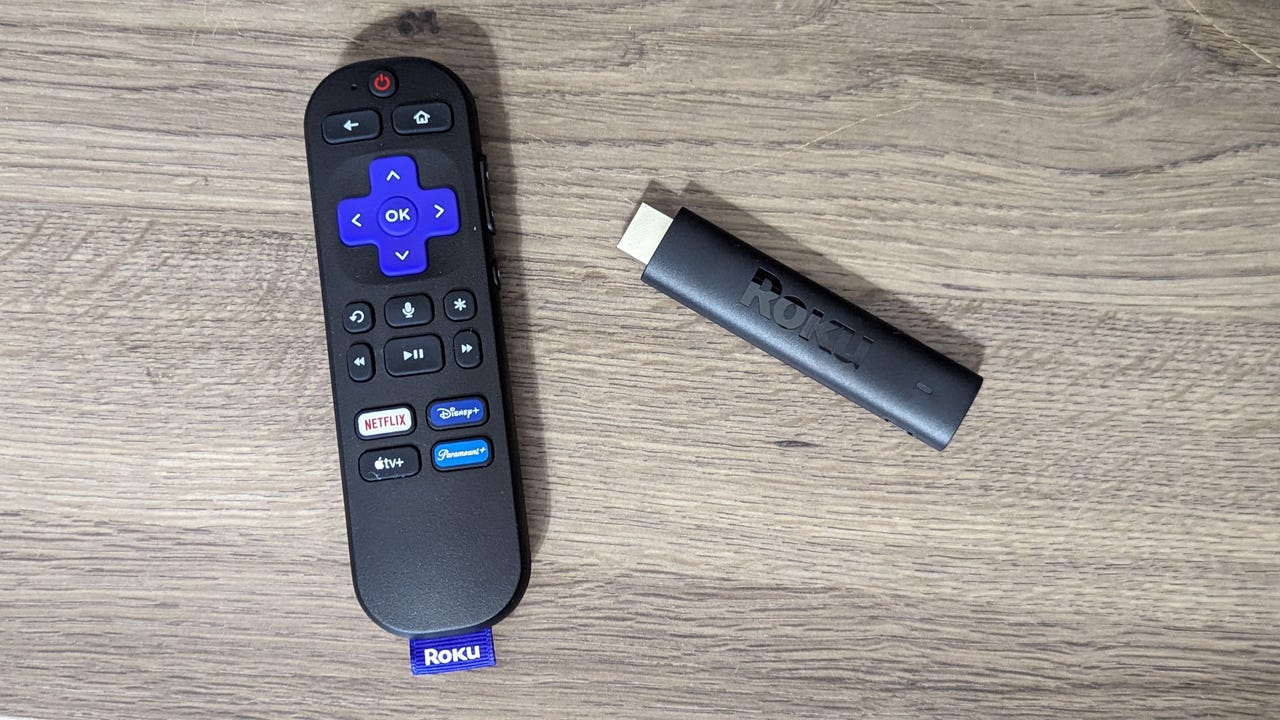































 Artie Beaty/
Artie Beaty/ There's no shortage of streaming sticks and devices on the market today, but perhaps the leader in the game, Roku, has been pretty much the same since it first debuted a little more than five years ago.
Also: Everything we're expecting at Amazon's Devices and Services event this week
You might be asking then, is anew Roku stick even necessary? If there aren't many changes -- and since it's almost impossible to buy a TV these days that's not a smart TV with apps built-in -- what's the point?
TheRoku Streaming Stick 4K answers those questions and proves that yes, it still has a place in today's streaming world.
The Roku 4K streaming stick hides behind your TV and brings any non-Roku television into the user-friendly streaming world of Roku.
View at AmazonEverything about the latest Roku stick immediately felt familiar when I unboxed it. Included is the streaming stick, a micro-USB power cable with a long-range Wi-Fi receiver, USB power brick, and the traditional Roku remote, this time with Netflix, Disney+, Apple TV+, and Paramount+ shortcuts at the bottom.
Also: Roku vs Fire Stick: Which one is right for your streaming needs?
The overall design of the stick is plain and unobtrusive, but that's what you want since it's designed to be placed in the back of your television and never seen again. It's a small rectangle several inches long that plugs into the HDMI input of your TV and to a power outlet to bring that television into the Roku ecosystem.
You can plug the stick straight into the USB power on your TV, but that means the stick will reboot every time the TV is turned off and on, while plugging in via a power outlet keeps the stick ready all the time.
One of the biggest advantages of Roku's streaming ecosystem is that it's incredibly easy to set up and use, making it a fantastic option for beginners. The interface is the easiest to use of all the options in my opinion, and it's the same no matter if you're using an external stick or if it comes with the TV.
I timed the whole process; from unboxing to pairing the remote to downloading and installing an update to logging into Netflix took exactly eight and a half minutes. And that's including the time it took to change the streaming stick to another HDMI input when the device realized I wasn't getting the best quality (I had it plugged into a port that didn't support HDMI 2.0) and suggested I change.
Also: Roku is adding over 40 free channels, including local news
The setup process guides you through selecting the streaming apps you want on your home screen, but others can be added or taken away (or even moved around) at any time. Apps can even be added from your computer if you're logged in to your account.
Once I had everything ready to go, I immediately headed to test out the biggest upgrade theRoku Streaming Stick 4K has to offer. While it's mostly similar to the previous Roku streaming stick, it brings one fairly significant improvement -support for Dolby Vision (which essentially makes dark colors darker and bright colors brighter, increasing the contrast).
I didn't have an old Roku stick to compare it to, but I immediately noticed that things looked exactly the same as my main TV. And that's a good thing. The image on the screen through the Roku streaming stick looked exactly like the image straight from the television itself in Dolby Vision 4K.
While I couldn't do a side-by-side, I did a little test of my own. I had my wife queue up the same part of the show while I left the room, without me knowing whether or not she had switched to the main TV. When I came back, I couldn't tell whether she had turned the TV back to the native streaming app that's built-in or if it was still on the Roku stick (Spoiler: it was the Roku still).
Also: Best TV screen cleaners compared: Keep all of your electronic screens clean and shiny
The stick also supports HDR10/10+, streams at 60 FPS, and upscales content from 720p and 1080p, meaning older content is going to take on new life. When I pulled up an episode of an old sitcom to test out the upscaling, it looked just like it does on fancy, much more expensive televisions that have the same technology built-in.
Navigation was fast, and menus loaded very quickly -- even faster than an actual Roku TV elsewhere in my home.
The newest Roku stick comes with a$50 price tag , putting it exactly in line with the latest Amazon Fire Stick and Google Chromecast. And given that the Roku system is easier to navigate than the others, I think there's a clear winner.
It's worth noting that there is aRoku Streaming Stick 4K+ available for about$20 more, and from all that I could find, the actual streaming stick is the exact same between the two. The plus version just gets a better remote, the Voice Remote Pro. The Pro remote adds a hands-free button that lets you turn on and off voice commands, a headphone jack, and two programmable shortcut buttons that let you choose a channel of your own. Perhaps the biggest upgrade is that it comes with a rechargeable battery you can plug into a wall outlet.
Whether that upgrade is worth the extra price or not depends on your situation, but I can confirm the base model of theRoku 4K Streaming Stick is certainly worth the investment if you have a TV you're looking to bring into the Roku ecosystem.
 Hot Tags :
Our process
Home & Office
Home Entertainment
Streaming & Services
Streaming Devices
Hot Tags :
Our process
Home & Office
Home Entertainment
Streaming & Services
Streaming Devices